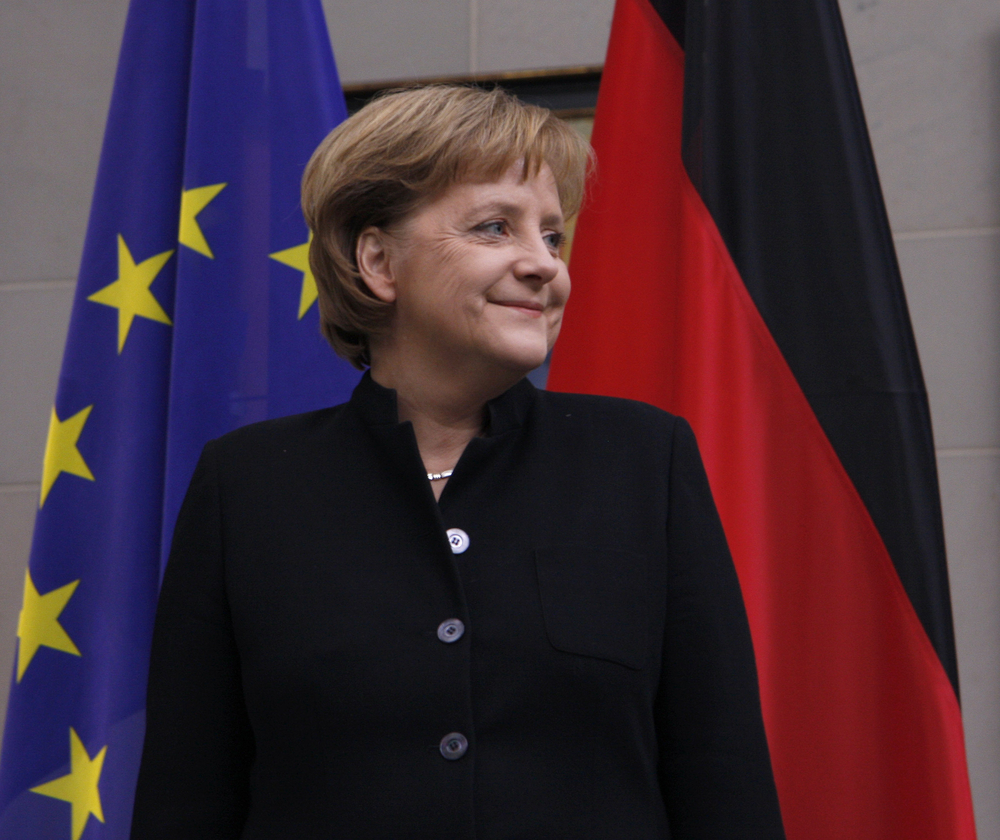15 Jul 2013 | Europe and Central Asia, News
German chancellor Angela Merkel has called for more stringent EU data protection rules, after allegations that US surveillance programmes have also impacted EU citizens. Sara Yasin reports
In an interview with ARD television yesterday, the German leader called for privacy rules that apply to all member states, as online companies are currently only required to follow legislation where they are registered. Facebook, for example, is registered in Ireland and is only required to follow Irish privacy laws.
Merkel also told ARD that she expects the United States to abide by Germany’s privacy laws in the future.
While Merkel has claimed that she learned of US mass surveillance from the media, German daily Bild reported that the country’s foreign intelligence agency (BND) knew about the programme as well as storage of German data for many years now. Bild also reported that data stored was also used by German intelligence to locate citizens kidnapped abroad.
Index, along with English PEN, Open Rights Group, and Article 19 have called on the European Parliament “to support a Data Protection Regulation that helps people regain control of their personal data.”
In a letter sent to Sarah Ludford MEP, a shadow rapporteur on the European Parliament’s data protection dossier, the organisations stressed the importance of control over personal data:
Too often, people do not know how their information will be used, where it will be processed or who will have access to it. This is partly because the principles of the current data protection laws are insufficiently implemented. We believe the new Data Protection Regulation could give people more control over what happens to their information, and ensure those that collect and use data adhere to the rules.
The European Parliament has ordered a probe into allegations that the United States has spied on EU citizens and diplomats. The Civil Liberties Committee will hold an inquiry, and plans to release a report by the end of this year.
Sara Yasin is an Editorial Assistant at Index. She tweets from @missyasin
15 Jul 2013 | In the News
INDEX EVENTS
18 July New World (Dis)Order: What do Turkey, Russia and Brazil tell us about freedom and rights?
Index, in partnership with the European Council on Foreign Relations, is holding a timely debate on the shifting world order and its impact on rights and freedoms. The event will also launch the latest issue of Index on Censorship magazine, including a special report on the multipolar world.
(More information)
19 July: What surveillance means to YOU
Join us 19 July for a live Google hangout with Index on Censorship as Trevor Timm of the Electronic Frontier Foundation and Rebecca Mckinnon of Gloval Voices discuss what mass surveillance means to all of us as individuals. Hosted by Padraig Reidy of Index, the hour-long event will delve in the issues around government surveillance of innocent civilians.
(More information)
BRAZIL
Brazil eyes internet bill amid spying leaks
With reports of NSA internet spying, Congress reconsiders stalled bill that some say would have prevented it.
(Al Jazeera)
GLOBAL
Week in Review: Criminalizing Free Speech and Spying to Crush Dissent
Most popular stories of the week
(Global Research)
INDIA
Impediment of Speech and Imbalance of Justice
In March 2013 Gujarat Chief Minister Narendra Modi was invited by some pro-business, pro-industry students at an American university to give a keynote address via video conference.
(Dissident Voices)
LIBYA
In liberated Libya, women struggle to raise their hand
Some women see Libya’s transition as a prime opportunity to improve their standing in society and gain political power, but societal norms still stand in the way.
(The Christian Science Monitor)
RWANDA
Rwandans Consider Their Media Free – Survey
A Rwanda Media Barometer (RMB) survey carried out by Rwanda Governance Board (RGB) and consultants from Transparency International Rwanda has shown that media freedom in the country, in the perceptions of its population, was at its highest.
(AllAfrica)
TUNISIA
Tunisia’s Tamarod steps up campaign to dissolve parliament
Tunisia’s Tamarod has continued its campaign to collect signatures for a petition demanding parliament be dissolved, despite facing threats and media speculation.
(Egypt Indpendent)
TURKEY
Turkish journalists join up against censorship and violence
Protests against the Turkish government continue, with journalists and artists now joining the fold. They’re speaking out against the violence against journalists and censorship of the press that takes place in Turkey.
(DW)
Turkey may face political disaster if Morsi doesn’t return to power: Turkish analyst
A senior Turkish political analyst says Turkish Prime Minister Recep Tayyip Erdogan’s strong opposition to the ouster of Egyptian President Mohamed Morsi by the army may have “disastrous political consequences” for Turkey if the Muslim Brotherhood fails to return to power in Egypt.
(Tehran Times)
UNITED KINGDOM
UK Ideological Travel Ban Helps Hate
So, this sounds like as good a time as ever to make a counterintuitive argument. Pamela Geller and Robert Spencer—two notable critics of “creeping sharia” and the “Islamization” of America—were invited to speak at an English Defense League (EDL) rally in Woolwich, the city where a British soldier was brutally murdered in May in what has been described by authorities as a terrorist attack. The EDL is a far-right nativist street protest group, formed out of the soccer “hooligan” subculture in Britain. It is frequently identified as a “hate group.”
(ACLU)
UNITED STATES
Should we have a list of words for self-censorship?
The other day, a young child scolded her father for using the “S” word. She further explained her teacher had told her class not to call people the “S” word, From this information the word might have been “stupid” or “silly,” adjectives important today.
(Delaware Online)
JFK’s mind-blowing speech on secrecy and the role of newspapers
“The very word “secrecy” is repugnant in a free and open society; and we are as a people inherently and historically opposed to secret societies, to secret oaths and secret proceedings…”
(ZD Net)
Steelers, Dolphins have no comment on Pounceys’ “Free Hernandez” hats
Earlier today, a photo surfaced of Steelers center Maurkice Pouncey and Dolphins center Mike Pouncey wearing “Free Hernandez” hats, apparently at their recent birthday party.
(NBC Sports)
Previous Free Expression in the News posts
July 12 | July 11 | July 10 | July 9 | July 8 | July 5 | July 4 | July 3 | July 2 | July 1
12 Jul 2013 | Digital Freedom
Whatever happens to the NSA whistleblower, the repercussions of his actions will endure

Edward Snowden placards at a protest in Berlin (David von Blohn/Demotix)
This is a guest post by Daniel Keane
Edward Snowden’s leaks have exposed an ideological chasm between the partisans of free information and liberty and the guardians of state security. They have also asked demanding questions of the public at large: when does intelligence gathering become an unwarranted intrusion into private lives? Is the first responsibility of an intelligence agent to the country he serves or to a — self defined — greater good? Can we have a free society without people who do dirty work like spying on our emails?
Public reaction in the polls remains mixed, with a Huffington Post/YouGov’s poll this week finding that 38 per cent of Americans believe Snowden did the wrong thing, while 33 per cent believing the contrary. However a survey released by Quinnipiac showed that 55 per cent of Americans believed Snowden was a whistle blower rather than a traitor.
Snowden also denied in interviews published that he gave any information to the Russian or Chinese governments while in transit there. Allegations of leaking information to these authorities arose from the New York Times, which claimed China had ‘drained the contents of Snowden’s laptops’. Snowden claimed he “never gave any information to either government.”
Snowden also declared in an interview given before he left his home in Hawaii with German newspaper ‘Der Spiegel’ that the NSA is “in bed together with the Germans the same as with most other Western countries” and that the USA and Israel co-wrote Stuxnet, the malicious computer virus utilised against an Iranian nuclear site.
These revelations made by Snowden come as a shock to the public consciousness and this is certainly reflected in the activities of pressure groups in the US and the UK. The Electronic Privacy Information Center, based in Washington DC, has filed an emergency petition to the US Supreme Court in order to halt the NSA’s logging of the nation’s telephone records.
Meanwhile in the UK, human rights group Liberty has filed a claim to the Investigatory Powers Tribunal against the British Intelligence Services for their role in the PRISM or Tempora surveillance programmes. It remains to be seen, however, whether both of these attempts to halt or impair mass surveillance will be successful: the US Supreme Court is unlikely to do away with a programme seen as vital to domestic security, while the IPT makes its decisions in private leaving any reform in Britain largely improbable.
If he reaches asylum, possibly in Nicaragua, Venezuela or Bolivia, Snowden could continue to leak crucial information regarding the NSA. The Obama administration finds itself in a crisis should he evade extradition: the inevitable slew of secrets weakening their international credentials.
Furthermore as Snowden reveals more regarding the collaboration of the US with Western European states, countries like Britain and France face a public dilemma as we learn more about the undermining of our personal liberties. These governments risk being whisked into undesirable public debate regarding the legitimacy of organisations such as GCHQ.
Even if Snowden returned to America to face trial the issue would not disappear. People will want to hear what he will say in court.
Many governments probably wish Edward Snowden was condemned to perpetual Limbo in Sheremetyevo Airport. But whatever happens, the repercussions of his actions are sure to endure for a long time as the debate between liberty and security rages ever on.
10 Jul 2013 | Asia and Pacific, Digital Freedom, India
Two surveillance entities are being set up to monitor Indian citizens’ communications, Mahima Kaul writes
(more…)


